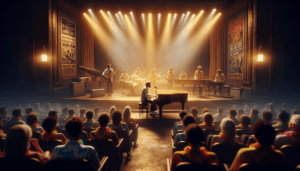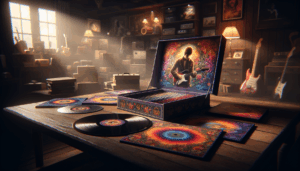On February 5, 1970, a historic moment in rock history unfolded at the BBC Studios in London when Mick Ronson made his debut with David Bowie during a John Peel session. This would be the beginning of a collaboration that would forever alter the course of Bowie’s career—and the entire landscape of rock music. Though the Space Oddity album, which was finished prior to Ronson’s arrival, wasn’t considered a “rock” album, the guitarist’s presence during that first show helped push Bowie’s sound into a new, bold direction.
A Game-Changing Collaboration
Producer Tony Visconti, reflecting on their partnership, shared how he and Bowie realized they were missing something essential in the making of Space Oddity. “We respected the rock groups around at the time like Cream and such, but we didn’t have it in us! We needed someone to be that important element,” Visconti remembered. Enter Mick Ronson.
The first time Visconti and Bowie met Ronson, the guitarist was hesitant and unsure of what he was getting into. But that quickly changed. “His guitar playing completely captivated us,” Visconti recalled, adding that Ronson’s northern humor kept them laughing throughout their work. It was clear that Ronson’s unique style would become an irreplaceable asset to Bowie’s evolving sound.
The Spiders From Mars Era
Ronson’s influence on Bowie was undeniable, especially during the creation of The Rise and Fall of Ziggy Stardust and the Spiders from Mars in 1972. Ronson wasn’t just Bowie’s guitarist—he was a driving force behind the glam rock movement, shaping the visual and musical landscape that would inspire countless bands for decades to come.
In fact, without Ronson’s distinctive guitar riffs and collaborative genius, Ziggy Stardust might never have materialized. Visconti admitted, “If it wasn’t for Mick, who knows? There might have been no Ziggy Stardust.” This powerful collaboration marked the peak of their artistic bond, propelling Bowie into superstardom and defining a new era of rock music.
The Underappreciated Talent
Despite the immense impact Ronson had on Bowie’s success, he never sought the limelight in the way other rock stars did. After leaving the Spiders From Mars, he pursued a solo career and worked with various artists, including Ian Hunter and Mott the Hoople, but his post-Bowie career didn’t achieve the massive solo success many expected.
Ronson himself acknowledged that he thrived in collaborative settings rather than solo fame. “I need people to write with and perform with there all the time,” he confessed. His willingness to serve as a musical anchor for others—while never fully seeking the spotlight—remains one of his most endearing qualities.
A Lasting Legacy
Although Ronson’s time with Bowie was relatively short, his legacy is lasting. Even after his untimely death from liver cancer in 1993, his impact on music remained undeniable. Artists like Morrissey and John Mellencamp have spoken at length about how Ronson’s guitar work helped shape their music and how he had a unique and irreplaceable style.
Morrissey once said, “Mick had been David’s lifelong asset – no one else.” And as we reflect on their collaboration, we can all be thankful for the musical magic that Bowie and Ronson created together.





